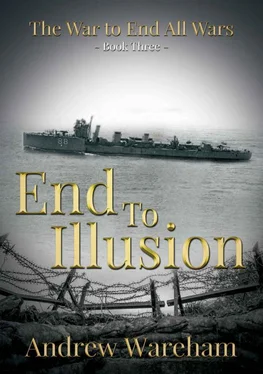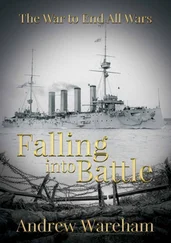Christopher tended to agree.
“Possible that the Austrians might send a coaster out in disguise, sir. A little five hundred ton tramp steamer, sort of thing there’s hundreds of in the Med, with a mine ramp in the stern for laying a dozen or two at night. Unlikely, though. Holiday time for us, sir.”
The admiral in Alexandria agreed.
“Nothing for you to do here, Adams. Best thing for you to do is to take the flotilla through the Canal and into the Red Sea. Work the coast south as far as Somaliland and back to Port Suez. Slavery patrol. Small boats like yours can get inshore. Stop every dhow and coaster you see and rummage them thoroughly. There’s slaves going into the Arabian peninsula still. Bloody thousands of them every year. Go south on the African coast and then make your way to Aden and back up the Red Sea coast towards Jeddah and then back to Suez. Keep an eye out for Turkish gunboats. Supposedly, and I don’t believe it meself, there are one or two naval craft still working out of the small sheikhdoms along the Arabian coast between the Gulf and the Red Sea. Won’t be anything to worry about if they are there.”
“Yes, sir. Can we go into the yard, sir, and have an extra freshwater tank fitted? There would be space in the fish hold, sir. The boats have bunkers for six weeks, sir. I don’t believe their water could hold out that long in the Red Sea.”
“Sensible suggestion, Adams. I will organise it. Take a few days. Give your people shore leave for the while.”
Christopher returned to the flotilla and asked the skipper of Hans Heine to call the other four to him to listen to their orders.
“The bloody Red Sea? In these boats, mister?”
“Yes, gentlemen. Slavery patrol. We are to have extra water capacity. I will ask about tropical uniforms as well.”
The skippers were outraged.
“What a good idea! These trawlers are designed for the Arctic Fishery, mister! The messdeck, such as it is, is set up to keep the men warm! No ventilation. Small scuttles and them fixed closed. They’ll be like bloody ovens in the Red Sea.”
“Hammocks in the open fish hold, is all I can suggest. Indent for canvas awnings to cover the deck in the day, like the Chinese gunboats have. Nothing else we can do, except to buy in as many crates of beer as you can smuggle aboard. Double up on tea. Try to get big floppy hats in the markets. Warn the men never to take their shirts off – they’ll burn in minutes. Salt tablets! The Medical Officers should have plenty of them for us to take. I’ll talk to the Port Medical Officer myself, get his advice.”
They were not appeased. The orders were crazy and they had no way to avoid them short of outright mutiny.
The flotilla entered the Suez Canal three weeks later, water tanks fitted and scrubbed out and filled with a thousand gallons apiece of additional drinking supplies. After much pleading, the admiral had found a sick berth attendant for Hans Heine to provide medical cover for the whole flotilla. He presided over a pair of bunks fitted into the hold space and walled off by canvas. There was a cupboard as a dispensary, filled with salt and quinine tablets and with a few bandages and bottles of carbolic for basic first aid. They were off to play at being policemen, had no expectations of battle.
Traffic south was sparse but more than compensated for by the flow of Australian and New Zealand troopships heading north for the Dardanelles. It was now certain there was to be a major landing at Gallipoli, the mainly ANZAC force to take Turkey out of the war in a single stroke.
“Good idea, if it works, Adams.”
Skipper Murchison was hopeful that the plan would come off.
“Opens the Black Sea to the Navy and allows convoys to bring military aid to Russia. Add to that, every chance of hitting up the Danube and into the soft underbelly of Austria-Hungary. One campaign and Germany is encircled. Cut off the oil supplies from Romania and that will put their fleet out of action. Makes good sense if it can be done.”
“Big ‘if’, sir. What I saw said easy land to defend. Mountainous, rough terrain. The invaders having to scale ridge after ridge and taking losses at each one. Be worse than the trenches.”
Suez offered a last chance of civilisation. They peered at the little town and passed on the opportunity – it was poor, dusty, dry and seemed to be inhabited exclusively by cheap whores and their unpleasant pimps.
“South down the coast, Adams!”
Dry, dusty and never-ending; the Red Sea coast was as unattractive a land as Christopher had ever seen. The temperature never fell below eighty at night and topped ninety-five every day; the little stokeholds reached one hundred and forty.
“Five knots maximum, sir. If we try for an average of eight we will kill the stokers. As it is, they are working one hour on, one off and drinking half a gallon in that time. Salt tablets every hour. It’s breaking them, and the engineer who has to do his four hours down there.”
“What about doubling the number of stokers, Adams? Shift say four seamen into the stokehold?”
“They’d mutiny, sir. Deckhands to turn to shovelling coal? They wouldn’t do it.”
Murchison reluctantly agreed – stokers and deckies barely talked to each other, there was no possible way they could do each other’s jobs.
“Right. Full speed only in action, with all hands called. Have we sufficient water for six weeks out?”
“Only if we refill in Aden, sir. From all I hear we won’t be popular if we do that – always short of water there. Might be forced to go south down the coast as far as the East African colonies. Mombasa has water, or so I would think.”
“Too far. Well off our station, Adams!”
“Not if we are in pursuit of a steamer carrying slaves. Certain information that she has headed south and intends to make for the Persian Gulf after getting clear. Lose her on the way and too far to make Aden without water. Forced to head for the nearest port.”
“Bad business if we are caught, Adams!”
“With respect sir, how? You are a skipper with effective rank of lieutenant commander. No chance of promotion for a skipper, you are as far up the tree as you can be. I am stuck in my rank until the war ends and I can send my papers in. What have we to lose, sir?”
“Nothing. Always wondered about retiring to a plantation in Kenya, you know, Adams. Might take the chance to have a look at the place while I’m there. What about you? Where will you go after the war?”
“After the war, sir? Another year at least in this fight. Can’t be more than two, summer of ’17 at the latest, must end by then. That’s a long old time, sir. If I’m still alive and kicking, I’ll make my mind up then. It won’t matter much – can’t go Home so I don’t care where I do end up.”
“Not staring down the barrel of your revolver, I hope, man! No sense in that!”
“No sense in anything for me, sir.”
They leaned on the railing of the little bridge, taking care to remain in the shade of the small awning they had rigged, and whistled for the steward. He came up with two bottles from the net towing astern, cooler than the air about them if not actually cold.
“Best tonic water, sir.”
Neither would take alcohol on duty, tempting though a beer might be. They would not permit booze to the hands during daylight hours and would not break that rule themselves. They drank a bottle of tonic water or lemonade every hour, with tea in between and a pint of water taken religiously every time they came on watch. They were still thirsty.
The sick berth attendant made his rounds every day, asking the same question of every man.
“What colour is your urine?”
They knew the answer had to be none at all – the water going out had to be the same colour as the water going in. That was the sole way of being sure they were drinking enough.
Читать дальше












